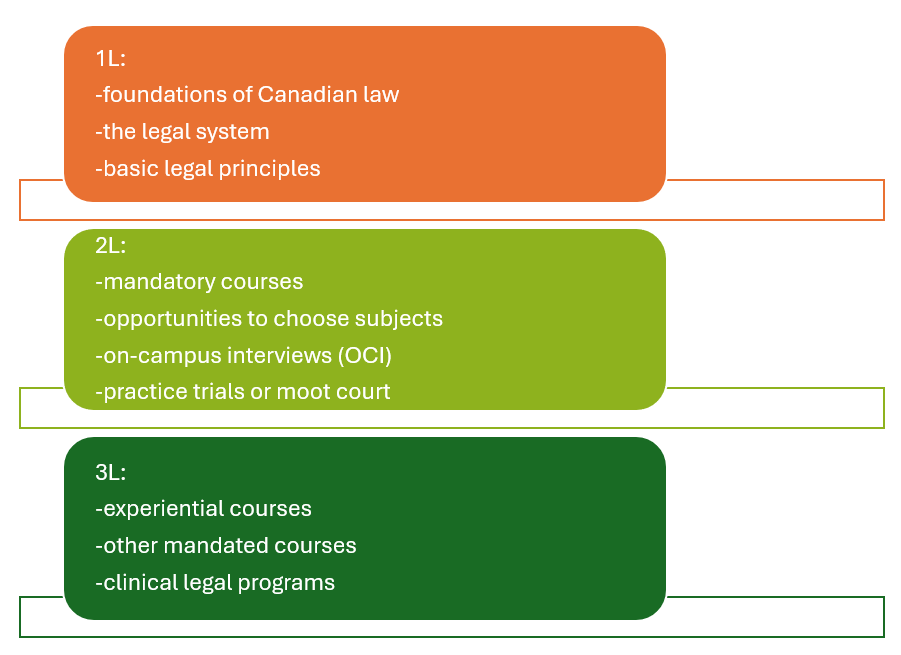
The answer to “how long does it take to be a lawyer in Canada?” is not as straightforward as it looks. Estimate your time in law school with this article

Some would say that being faster is the better route; not necessarily in law school.
To find out how long it takes to be a lawyer, we’ll add up the number of years based on the law curriculum and other factors. In the end, completing law school within a set timeframe depends on one person: you!
This article is for middle school or college students who want to learn how long it takes to finish law school. We’ll also go over factors that can delay the process.
Studying law in Canada will take up to around eight years. Here's the breakdown of this estimated timeframe:

Read further below for more details on these items and their durations. To give you an idea of how to prepare for law school, watch this video:
Check out this article on Canadian law schools to help you choose where to go for your law studies.
Having finished your undergraduate or bachelor’s degree is one of the important Canadian law school requirements before you can be admitted to law school. Most of them would require, at a minimum, three years of undergraduate studies. Having a four-year degree would not hurt.
It can be any degree, since Canadian law schools do not require a specific pre-law studies or degree. It can also be from any university or college, but with additional conditions for international students.
Foreign and international graduates must check with their preferred law school if their degree, and the college they graduated from, are accepted by the law school.
If you want to enter law school right after graduation, you will have that short window of time to prepare for the requirements. You must be quick, since you only have a few months until the deadlines for law school admissions.
Canadian law schools tend to set the first week of November as the deadline for their regular 1L admissions. It’s still best to check the admissions timeline of your chosen law school, as this may change every year.
The Law School Admission Test (LSAT) is a standardized test administered by the Law School Admission Council (LSAC). It will test you on:
Canadian law schools may or may not require that you take the LSAT before you can be admitted for 1L. If they do, you must also check the month of the latest LSAT score they will accept. This is to help you plan when and how you are going to take the LSAT.
Writing the LSAT must be timely and must coincide with what your chosen law school requires. Otherwise, you would have to wait for another year, delaying your law school journey.
In Canada, there are two curriculums that you must take to become a lawyer. It will depend on whether you want to practice law in a common law province or in Québec, which is Canada’s civil law jurisdiction:
If you’re interested in studying civil law in French Canada, here’s our guide on law schools in Québec.
The JD, LLL, and LLB will take up to three years to complete, as per the prescribed curriculum implemented by the faculties of law. These three years are as follows:

In between these are summer opportunities for you to intern at law firms, work with your law professors, or take on more courses if offered.
To help you stick to your law school timeline, aim to do well in your OCIs. Here’s how you can ace those on-campus interviews.
Completing your JD, LLL or LLB may be extended due to several reasons, such as:
You may have to repeat another year in law school if you fail a mandatory or a pre-requisite course. If it’s an optional course, you can take another course that has a similar number of credits in the next term.
To avoid having to repeat another year, you can propose to overload your courses the next term or year. But this is usually subject to the approval of your law school.
If you’re transferring from another law school, the school you’re transferring to will evaluate your records. It may or may not consider the transfer credit for the 1L law courses that you’ve taken. Most law schools would require you to take additional courses that were not offered by your previous law school.
International students might also have to repeat courses they’ve already taken. This may add up another one to two years, depending on which courses are credited by the Canadian law school they’re transferring to. A major consideration is the curriculum of their previous law school, and whether it’s based on common law or civil law.
It’s crucial to anticipate these possible delays when you’re figuring out how long it takes to finish law school. Although the goal is to complete law school without any setbacks, setting your mind on these instances may help you bounce back when they happen.
Aside from the personal and external delays when studying law, the curriculum you chose may also be a factor for your longer stay in law school. Some schools in Canada offer joint, combined, or dual degrees, which run for four or six years instead of the usual three-year law degree.
Some examples of these joint, combined, or dual degrees are:
The JD is taken with a school from a common law province or outside Canada, and the LLB/LLL is taken with a law school in Québec (e.g., JD/LLB (Civil) offered by York University, while the LLB is taken with the Université de Montréal)
The second JD is taken in a law school outside Canada (e.g., International Energy Lawyers Program by University of Calgary which is a joint JD/JD program with the University of Houston)
The first three years of an undergraduate degree are followed by the usual JD program for another three years (e.g., Western University’s Honours in Business Administration and Juris Doctor (HBA/JD))
The JD is taken along with a master’s or graduate degree, either at the same university or in another one, whether in Canada or elsewhere (e.g., University of Victoria’s JD/MPA)
These joint, combined, or dual degrees can be an advantage if any of these interests you. It can also be a disadvantage if it will only make your stay in law school longer.
The entire licensing process, which includes the articling period plus the time to prepare and take the bar exams, may add up to another year. This is on top of the three years needed to complete your law degree.
As these are part of the licensing process to become a lawyer, both articling and the bar exams are done in coordination with your law society. To save time, it’s best to consult with your law society for their specific timeframes.
Articling is when you’ll be interning for a principal (who can be a licensed lawyer), a law firm, or a government office, among others. The articling period is around 8 to 9 months, depending on your law society.
Some law societies may also grant exemptions or reductions of the articling period to certain law students. For example, the Law Society of British Columbia says that the nine-month articling term can be reduced to a maximum of five months if you meet one of these conditions:
In Ontario, another option aside from articling is its Law Practice Program (LPP). This program runs from late August until the end of April.
To know more about the Law Society of Ontario’s experiential training paths, which includes articling or the LPP, watch this video:
Looking for law firms where you can article? Check out our Special Report on the best lawyers and firms in Canada in different areas and jurisdictions.
The bar exams are administered by your law society, which can be taken during or after your articling term. Mostly, you’re given the liberty to choose when you would want to take the exam, since it’s offered 2 to 3 times a year, depending on your law society. Consult your articling principal on when you plan to take the bar exam.
Provinces like Nova Scotia have replaced the bar exam with a new program called PREP.
After hurdling the bar exam — which is this last challenge you’ll have to overcome — you are now ready to be called to the bar and become licensed to practice law! One final step: complete all administrative procedures set by your law society, such as payment of certain fees and submission of required forms.
You may also have to attend a bar ceremony (also known as the call ceremony) to take your barristers and solicitors oath. Attending this ceremony in-person may or may not be mandatory – check with your law society to be sure.
From your undergraduate degree, to studying in law, to becoming licensed, it may take up to eight years in total to become a lawyer in Canada. This does not account for any delay in your studies, or other possible factors that will take you longer to finish law school. As you strive for success on your journey to becoming a lawyer, it’s equally important to value your time and appreciate the path you're on.
For more resources on studying to become a lawyer in Canada, head over to our Legal Education page.